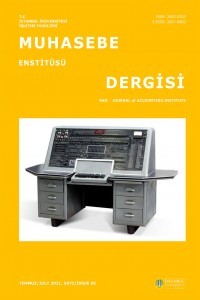An Approach to Integrating Historical Perspective into an Undergraduate Accounting Course
An Approach to Integrating Historical Perspective into an Undergraduate Accounting Course
Accounting education, Accounting history pedagogy,
___
- Albin, M. (1994). A cross cultural look at the origins and development of accounting. Accounting Educator’s Journal 6: 110-127.
- Albrecht, W.S. and Sack, R.J. (2000). Accounting education: Charting the course through a perilous future. Sarasota, FL: American Accounting Association
- Albrecht, W.S. and Sack, R.J. (2001). The perilous future of accounting education. The CPA Journal 71 (3): 16-23.
- American Accounting Association (AAA) (1986). Special Report: Future Accounting Education: Preparing for the Expanding Profession. Issues in Accounting Education, 1(1), 168-195.
- Amernic, J. and Elitzur, R. (1992). Using Historical Annual Reports in Teaching: Letting the Past Benefit the Present. Accounting Historians Journal, 19(1), 29-50.
- Amernic, J. and Craig, R. (2004). Reform of Accounting Education in the post- Enron Era: Moving Accounting 'Out of the Shadows. Abacus, 40(3), 342-378.
- Apostolou, B., Dorminey, J. W., Hassell, J. M., and Watson, S. F. (2013). Accounting education literature review (2010–2012). Journal of Accounting Education, 31(2), 107-161.
- Bisman, J. (2009). Making accounting historians. Accounting Historians Journal, 36(1), 135-162.
- Coffman, E. N., Roberts, A. R., and Previts, G. J. (1989). A history of the Academy of Accounting Historians 1973–1988. Accounting Historians Journal, 16(2), 155-206.
- Dellaportas, S. (2019). Accounting education what it is, and what it is not. Accounting Education, 28(2), 119-126.
- Demski, J. S. (2007). Is accounting an academic discipline?, Accounting Horizons, 21(2), 153-157.
- Diamond, M. (2005). Accounting education, research and practice: After Enron, where do we go?. European Accounting Review, 14(2), 353-362.
- Douglas, S., and Gammie, E. (2019). An investigation into the development of non-technical skills by undergraduate accounting programmes. Accounting Education, 28(3), 304-332.
- Etter, E. R., Burmeister, S. L., & Elder, R. J. (2000). Improving student performance and retention via supplemental instruction. Journal of Accounting Education, 18(4), 355-368.
- Flegm, E. H. (1991). The relevance of history in accounting education: Some observations. Journal of Accounting Education, 9(2), 355-363.
- Fogarty, T. J. (2010). Revitalizing accounting education: a highly applied liberal arts approach. Accounting Education: an international journal, 19(4), 403-419.
- Gendron, Y. (2015). Accounting academia and the threat of the paying-off mentality. Critical Perspectives on Accounting, 26, 168-176.
- Goldstein, J., Sauer, P., & O'Donnell, J. (2014). Understanding factors leading to participation in supplemental instruction programs in introductory accounting courses. Accounting Education, 23(6), 507-526.
- Gomes, D., Carnegie, G. D., Napier, C. J., Parker, L. D., and West, B. (2011). Does accounting history matter? Accounting History, 16(4), 389-402.
- Hines, R. D. (1989). Financial accounting knowledge, conceptual framework projects and the social construction of the accounting profession. Accounting, Auditing &Accountability Journal, 2(2), 72-92. Inanga, E. L. and Schneider, W. B. (2005). The failure of accounting research to improve accounting practice: a problem of theory and lack of communication. Critical Perspectives on Accounting, 16(3), 227-248.
- Jones, J. P., & Fields, K. T. (2001). The role of supplemental instruction in the first accounting course. Issues in Accounting Education, 16(4), 531-547.
- Kimmel, P. (1995). A framework for incorporating critical thinking into accounting education. Journal of Accounting Education, 13(3), 299-318.
- Parker, L.D., Guthrie, J., and Linacre, S. (2011). The relationship between academic accounting research and professional practice. Accounting, Auditing & Accountability Journal, 24(1), 5-14.
- Previts, G. J., Parker, L. D., and Coffman, E. N. (1990). Accounting history: definition and relevance. Abacus, 26(1), 1-16.
- Rankin, M., Stanton, P., McGowan, Ferlauto, K., and Tilling, M. (2012). Contemporary Issues in Accounting. Australia: Wiley and Sons. Richardson, A. J. (2008). Strategies in the development of accounting history as an academic discipline. Accounting History, 13(3), 247-280.
- Sangster, A., Stoner, G. N., and McCarthy, P. A. (2007). Lessons for the classroom from Luca Pacioli. Issues in Accounting Education, 22(3), 447-457.
- Sangster, A. (2010). Using accounting history and Luca Pacioli to put relevance back into the teaching of double entry. Accounting, Business & Financial History, 20(1), 23-39.
- Sangster, A., Franklin, E., Alwis, D., Abdul-Rahim, J., and Stoner, G. (2014). Using Pacioli’s pedagogy and medieval text in today’s introductory accounting course. Journal of Accounting Education, 32(1), 16-35.
- Scott, WR (2012). Financial Accounting Theory, 6th Edition. Toronto: Pearson Canada Inc.
- Sterling, R.R. (1967). A statement of basic accounting theory: A review article. Journal of Accounting Research, 5(1), 95-112.
- Sterling, R.R. (1973). Accounting research, education and practice. Journal of Accountancy (pre-1986), 136 (3), 44-52.
- Webb, J., & Chaffer, C. (2016). The expectation performance gap in accounting education: A review of generic skills development in UK accounting degrees. Accounting Education, 25(4), 349-367.
- Zeff, S. A. (1989). Does accounting belong in the university curriculum. Issues in Accounting Education, 4(1), 203-210.
- Zeff, S. A. (1999). The evolution of the conceptual framework for business enterprises in the United States. Accounting Historians Journal, 26(2), 89-131.
- ISSN: 2602-3202
- Yayın Aralığı: Yılda 2 Sayı
- Başlangıç: 1975
- Yayıncı: İstanbul Üniversitesi
Kurumsal ve Finansal Raporlamanın Geleceği Üzerine Değerlendirmeler
An Approach to Integrating Historical Perspective into an Undergraduate Accounting Course
Mohammad Reza TOUTOUNCHI ASL, Alper OFLAS
Finansal Okuryazarlık ve Üniversitede Verilen Derslerin Finansal Okuryazarlık Üzerine Etkisi
KOBİ IFRS’den Günümüze Finansal Raporlama Standartlarının Genel Bir Değerlendirmesi
